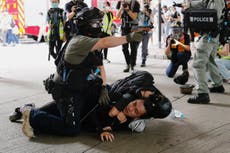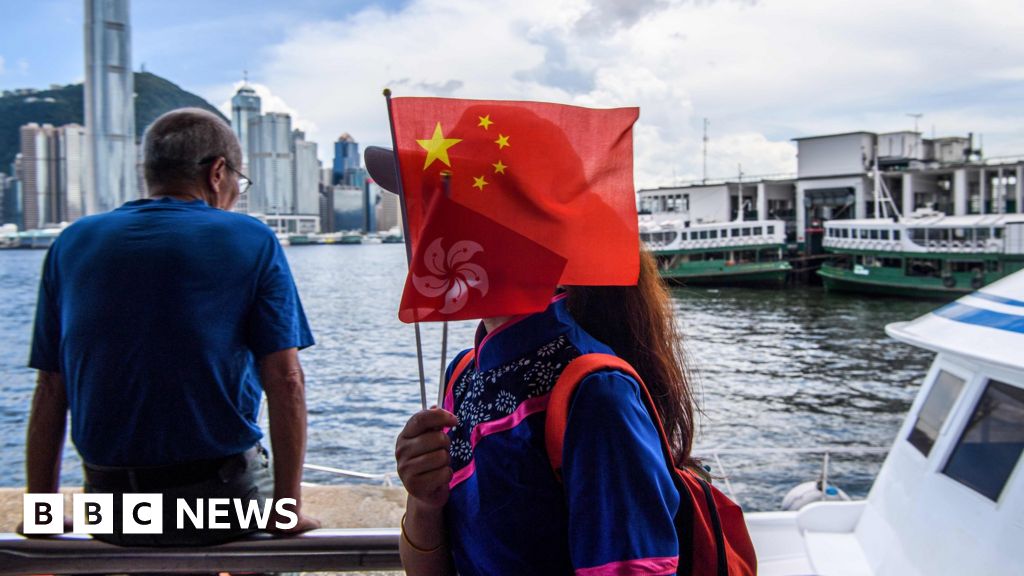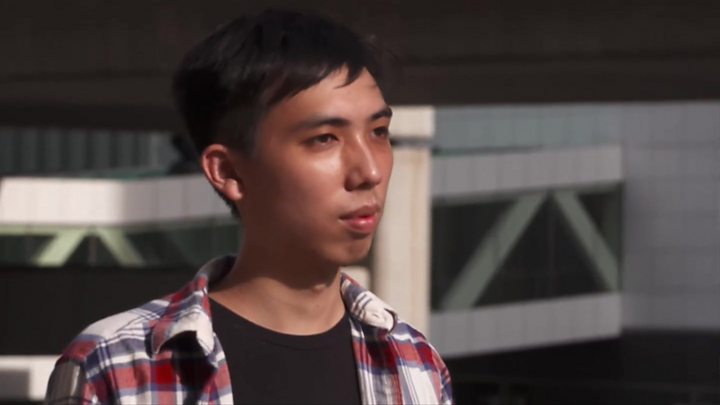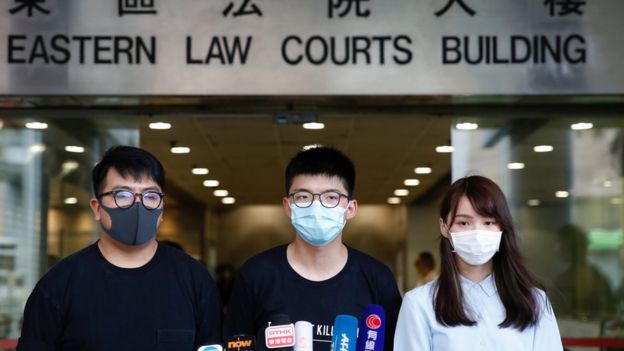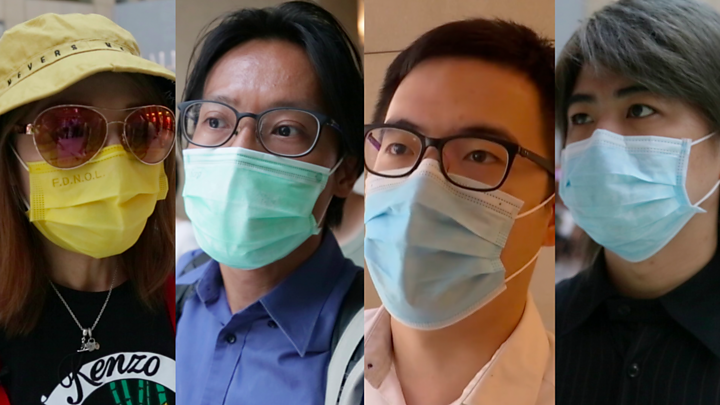Melodi
Disaster Cat
OK, internet connection is improving so I'm posting again - guys China just said they will prevent folks in Hong Kong even with BRITISH PASSPORTS from LEAVING Hong Kong. And they seem to have stopped just short of declaring war on the UK if they re-issue passports to 3 million or so folks that qualified for them in 1979 (and their kids and grandkids via UK law).
This is because CHINA BROKE THE TREATY with the UK this week, and while the UK itself wouldn't stand a snowballs chance in heck of taking on modern China on their own, this definitely ups the "Great Game" aspect of this whole thing to a super-high level, especially with the US putting sanctions on China this morning.
I personally think this story has legs and could be used as one of the excuses for WWIII, if it gets started for real.
China vows to retaliate if Britain extends Hong Kong citizenship plan
Fallout from new security law continues, as a prominent Hong Kong lawyer calls it 'worse than the worst-case scenario'
The Independent employs reporters around the world to bring you truly independent journalism. To support us, please consider a contribution.
China has threatened to take “corresponding measures” if the UK pushes ahead with a plan to offer millions of Hong Kong citizens a path to settlement in Britain.
Boris Johnson said on Wednesday that a new national security law imposed upon Hong Kong by Beijing was a “clear and serious breach” of the handover agreement through which the city was returned to China after 150 years of British colonial rule.
In response, he said, the UK will now open up visa restrictions for all Hong Kong citizens born before the 1997 handover, potentially offering a route to citizenship for up to 2.9 million people.
Reacting on Thursday, China’s foreign ministry spokesperson Zhao Lijian told a daily briefing that Beijing reserved the right to respond against Britain on the issue.
Without specifying what this might entail, Mr Zhao said that Britain would “bear all the consequences” of any moves China decides to take.
Read more
“We urge the British side to view objectively and fairly the national security legislation for Hong Kong, respect China’s position and concerns, (and) refrain from interfering in Hong Kong affairs in any way.”
On Wednesday night, the UK foreign secretary Dominic Raab admitted Britain wouldn’t be able to prevent China from blocking Hong Kongers from making the journey to the UK, if that’s what Beijing decided to do.
✕

Sponsored Ad
Up next
Who said it?

Skip in 5
“Ultimately if they follow through on something like that there would be little that we could do to coercively forced them,” he told ITV’s Peston programme.
Meanwhile, the fallout from a historic day for Hong Kong continued, as 10 riot police officers dramatically boarded a plane that was preparing to take off from the city’s main airport with a suspect, wanted in the stabbing of an officer during Wednesday’s mass protests, on board.
DAILY CORONAVIRUS BRIEFING
No hype, just the advice and analysis you need
Continue
According to local news station Cable TV, the suspect was on board a Cathay Pacific flight destined for London and travelling on an expired British National Overseas passport when three police vehicles drove up to the aircraft and the officers prevented it from leaving.
The stabbing was one of the more high profile single incidents of violence during Wednesday’s clashes, after Hong Kong police posted a picture of the stricken officer on social media and appealed for help finding the culprit.
Watch more
Former Hong Kong leader Leung Chun-ying had posted on Facebook saying that a bounty of HK$500,000 (£51,550) would be offered to anyone helping catch the fugitive.
The new Hong Kong security law has been described by critics as the death of the city’s “one country, two systems” principle of autonomy, and the end of the democratic freedoms its citizens were supposed to enjoy for at least 50 years under the 1984 Sino-British Joint Declaration, the international treaty that paved the way for Hong Kong’s return to Chinese rule.
Reaction continued to pour in on Thursday, with the full text of the new legislation kept secret by China’s Communist Party until it was passed into law on Tuesday night.
Hong Kong lawyer and academic Eric Cheung wrote on Facebook that the law was “worse than the worst-case scenario he had predicted”, according to a translation by the Hong Kong Free Press, with the text representing the spirit of China’s socialist legal system rather than Hong Kong’s independent judiciary, based on common law.
He highlighted a clause in the new law that says it applies to anyone harming the interests of Hong Kong, regardless of where they are in the world or their nationality. “All eight billion people in the world should read the Hong Kong national security law thoroughly, to avoid unwittingly breaking the law,” he said.
At the same time, the Hong Kong government continued its efforts to alleviate public concern about the law, which among other things states that judges in national security cases shall be appointed directly by the city’s pro-Beijing chief executive, rather than the judiciary.
Carrie Lam has said that she would appoint a panel of judges for all courts based on recommendations from a judicial body, rather than select judges for individual cases.
And in a rare public statement, the city’s chief justice Geoffrey Ma said judges would continue to be appointed on the merit of their judicial and professional qualities, not because of politics, in a process that would remain the responsibility of the judiciary.
Reassuring the public of the continued independence of Hong Kong’s judiciary is a key priority for the government, because it is credited in large part with maintaining the city’s status as a global financial powerhouse.
Hong Kong’s mini-constitution, the Basic Law, states that the city’s judges can be selected from any common law jurisdiction. Currently, its Court of Final Appeal has 23 judges, 15 of whom are from Commonwealth nations including Canada, Australia and Britain itself.
Chief justice Ma said that contrary to people’s fears, this policy would continue. “Judges of foreign nationality are not excluded. They are expressly permitted to be appointed as judges in Hong Kong,” he said.
Chinese state media praised the passage of the law, saying it would bring “prosperity and stability” to the city.
“We must face up to the fact that the existence of legal loopholes in safeguarding national security has already made Hong Kong society pay a heavy price,” read a commentary in the People’s Daily, the official newspaper of the Communist Party.
Australia’s prime minister Scott Morrison described the developments in Hong Kong as “very concerning”, and said that his country was working on proposals to provide “safe haven” to Hong Kong residents who wanted to flee.
And Taiwan, which China claims as a part of its territory and would like to see governed like Macau and Hong Kong under the “one country, two systems” principle, advised its citizens to avoid unnecessary travel to the city.
Speaking to reporters in Taipei, Chiu Chui-Cheng, deputy head of Taiwan’s Mainland Affairs Council, said the new Hong Kong law was the “the most outrageous in history”, with a reach that extended everywhere.
“Taiwan people should avoid making unnecessary visits to or transits via Hong Kong, Macau and the mainland,” he said.
This is because CHINA BROKE THE TREATY with the UK this week, and while the UK itself wouldn't stand a snowballs chance in heck of taking on modern China on their own, this definitely ups the "Great Game" aspect of this whole thing to a super-high level, especially with the US putting sanctions on China this morning.
I personally think this story has legs and could be used as one of the excuses for WWIII, if it gets started for real.
China vows to retaliate if Britain extends Hong Kong citizenship plan
Fallout from new security law continues, as a prominent Hong Kong lawyer calls it 'worse than the worst-case scenario'
- Adam WithnallAsia Editor @adamwithnall
- 3 hours ago
The Independent employs reporters around the world to bring you truly independent journalism. To support us, please consider a contribution.
China has threatened to take “corresponding measures” if the UK pushes ahead with a plan to offer millions of Hong Kong citizens a path to settlement in Britain.
Boris Johnson said on Wednesday that a new national security law imposed upon Hong Kong by Beijing was a “clear and serious breach” of the handover agreement through which the city was returned to China after 150 years of British colonial rule.
In response, he said, the UK will now open up visa restrictions for all Hong Kong citizens born before the 1997 handover, potentially offering a route to citizenship for up to 2.9 million people.
Reacting on Thursday, China’s foreign ministry spokesperson Zhao Lijian told a daily briefing that Beijing reserved the right to respond against Britain on the issue.
Without specifying what this might entail, Mr Zhao said that Britain would “bear all the consequences” of any moves China decides to take.
Read more
-
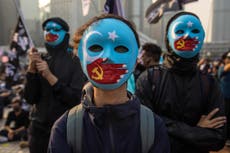
We can’t keep ignoring the bigger question about China and Xi Jinping -
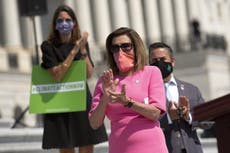
US House passes China sanctions over ‘brutal’ Hong Kong crackdown -
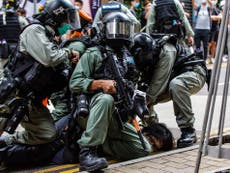
Can Britain afford to stand up to China over Hong Kong? -
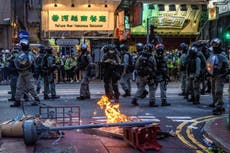
China’s self-interest remains Hong Kong’s best defence -

Why activists are so terrified by Hong Kong’s new security law
“We urge the British side to view objectively and fairly the national security legislation for Hong Kong, respect China’s position and concerns, (and) refrain from interfering in Hong Kong affairs in any way.”
On Wednesday night, the UK foreign secretary Dominic Raab admitted Britain wouldn’t be able to prevent China from blocking Hong Kongers from making the journey to the UK, if that’s what Beijing decided to do.
✕
Sponsored Ad
Up next
Who said it?

Skip in 5
“Ultimately if they follow through on something like that there would be little that we could do to coercively forced them,” he told ITV’s Peston programme.
Meanwhile, the fallout from a historic day for Hong Kong continued, as 10 riot police officers dramatically boarded a plane that was preparing to take off from the city’s main airport with a suspect, wanted in the stabbing of an officer during Wednesday’s mass protests, on board.
DAILY CORONAVIRUS BRIEFING
No hype, just the advice and analysis you need
Continue
According to local news station Cable TV, the suspect was on board a Cathay Pacific flight destined for London and travelling on an expired British National Overseas passport when three police vehicles drove up to the aircraft and the officers prevented it from leaving.
The stabbing was one of the more high profile single incidents of violence during Wednesday’s clashes, after Hong Kong police posted a picture of the stricken officer on social media and appealed for help finding the culprit.
Watch more
Former Hong Kong leader Leung Chun-ying had posted on Facebook saying that a bounty of HK$500,000 (£51,550) would be offered to anyone helping catch the fugitive.
The new Hong Kong security law has been described by critics as the death of the city’s “one country, two systems” principle of autonomy, and the end of the democratic freedoms its citizens were supposed to enjoy for at least 50 years under the 1984 Sino-British Joint Declaration, the international treaty that paved the way for Hong Kong’s return to Chinese rule.
Reaction continued to pour in on Thursday, with the full text of the new legislation kept secret by China’s Communist Party until it was passed into law on Tuesday night.
Hong Kong lawyer and academic Eric Cheung wrote on Facebook that the law was “worse than the worst-case scenario he had predicted”, according to a translation by the Hong Kong Free Press, with the text representing the spirit of China’s socialist legal system rather than Hong Kong’s independent judiciary, based on common law.
He highlighted a clause in the new law that says it applies to anyone harming the interests of Hong Kong, regardless of where they are in the world or their nationality. “All eight billion people in the world should read the Hong Kong national security law thoroughly, to avoid unwittingly breaking the law,” he said.
At the same time, the Hong Kong government continued its efforts to alleviate public concern about the law, which among other things states that judges in national security cases shall be appointed directly by the city’s pro-Beijing chief executive, rather than the judiciary.
Carrie Lam has said that she would appoint a panel of judges for all courts based on recommendations from a judicial body, rather than select judges for individual cases.
And in a rare public statement, the city’s chief justice Geoffrey Ma said judges would continue to be appointed on the merit of their judicial and professional qualities, not because of politics, in a process that would remain the responsibility of the judiciary.
Reassuring the public of the continued independence of Hong Kong’s judiciary is a key priority for the government, because it is credited in large part with maintaining the city’s status as a global financial powerhouse.
Hong Kong’s mini-constitution, the Basic Law, states that the city’s judges can be selected from any common law jurisdiction. Currently, its Court of Final Appeal has 23 judges, 15 of whom are from Commonwealth nations including Canada, Australia and Britain itself.
Chief justice Ma said that contrary to people’s fears, this policy would continue. “Judges of foreign nationality are not excluded. They are expressly permitted to be appointed as judges in Hong Kong,” he said.
Chinese state media praised the passage of the law, saying it would bring “prosperity and stability” to the city.
“We must face up to the fact that the existence of legal loopholes in safeguarding national security has already made Hong Kong society pay a heavy price,” read a commentary in the People’s Daily, the official newspaper of the Communist Party.
Australia’s prime minister Scott Morrison described the developments in Hong Kong as “very concerning”, and said that his country was working on proposals to provide “safe haven” to Hong Kong residents who wanted to flee.
And Taiwan, which China claims as a part of its territory and would like to see governed like Macau and Hong Kong under the “one country, two systems” principle, advised its citizens to avoid unnecessary travel to the city.
Speaking to reporters in Taipei, Chiu Chui-Cheng, deputy head of Taiwan’s Mainland Affairs Council, said the new Hong Kong law was the “the most outrageous in history”, with a reach that extended everywhere.
“Taiwan people should avoid making unnecessary visits to or transits via Hong Kong, Macau and the mainland,” he said.

